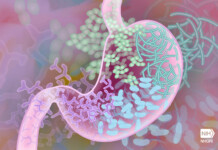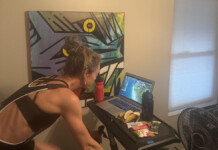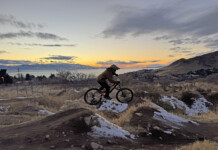By Nancy Clark MS RD CSSD — Do you know the bacteria in your gut can enhance athletic performance? Or the sports you play when you are a kid impact your bone health as a young adult? Or your ability to exercise in the heat depends on how well you hydrate? At the annual sports nutrition conference hosted in March 2021 by SCAN (the sports nutrition practice group of the Academy of Nutrition & Dietetics; SCANdpg.org), the speakers offered updates on these topics of interest.
Performance-enhancing probiotics: A new frontier?
Athletes have endurance, strength, ability to recover from injuries, and strong minds. Could those traits be connect-ed to the athletes’ microbiome‑-those health-enhancing bacteria that live in their gut? Are the gut-brain and the gut-muscle connections in elite athletes comparable to those of non-athletes? Can the microbes of elite athletes offer information applicable to others?
To discover the impact of the microbiome on exercise performance, FitBiomics, a biotechnology company based in NYC, is studying the microbiome of top athletes, looking for performance-enhancing microbes. For example, marathon runners (compared to non-runners) have a higher amount of the bacteria Veillonella that efficiently eats lactic acid and reduces inflammation. Mice fed Veillonella improved 13% in endurance running. What if marathoners consumed Veillonella supplements? Would that help them run faster? More research is needed, but the information to date seems promising, so stay tuned!
Parents: Bone up on bone health for your kids
Given that up to 90% of peak bone mass is reached by age 18 in females and age 20 in males, parents should encourage their kids to participate in bone-building sports. This means doing weight-bearing exercise— such as soccer instead of swimming—during early puberty. High impact sports like gymnastics and volleyball also contribute to bones with about 10% greater bone mass.
Multi-directional sports (i.e., soccer, basketball) are better for bone health than one-directional sports (cycling, swimming). The jumping, cutting, and stopping that happens during soccer and basketball leads to stronger, more fracture-resist-ant bones. Track and field athletes who had participated in ball sports (such as soccer, volleyball, etc.) when they were younger had 50% fewer stress fractures than their peers who had not done so. Same goes for male runners who had played basketball; they had 82% fewer stress fractures. Military recruits who had played soccer and basketball when they were kids experienced fewer stress fractures later in their lives during basic training. Clearly, we need to start early to optimize bone health!
Athletes reduce their bone mass when they restrict calories to lose weight. A smart nutrition recommendation for dieting athletes is to consume foods naturally rich in calcium, i.e., drink more dairy milk. Each cup of skim milk consumed by young female athletes reduced risk for future stress fractures in by 62%.
To help protect against stress fractures, at-risk athletes should consume at least 1,500 mg. a day of calcium + 800 IUs of vitamin D. Female military recruits who took calcium and D supplements for 8 weeks had 20% fewer stress fractures compared to unsupplemented peers. Getting adequate sleep also contributes to bone health.
Exercising safely in hot weather
With global warming, athletes are more likely to train and compete in unusually hot weather. To effectively reduce the risk of exertional heat stroke (and death), athletes should allow 10 to 14 days to acclimatize to exercising in hot weather. During acclimatization, the body adapts to dissipate more heat, thereby enabling athletes to perform better. Most physiological adaptations occur between days 4 to 8 of heat exposure.
During the first week of being exposed to heat, athletes should have only one training session per day. Ideally, they will have access to cool fluids during exercise (more likely to be consumed) and they will frequently take small swigs of fluid throughout exercise (preferable to gulping a large bolus of fluid all at once).
When exercising in the heat, athletes should monitor their urine for color and quantity and think WUT:
- Weight: Is my morning weight lower than the day before?
- Urine: Is my urine dark and concentrated?
- Thirst: Am I thirsty upon awakening?
Yes answers signal they are starting the day underhydrated.
In terms of health risks, being adequately hydrated is more important than being heat-acclimatized (though being well hydrated and heat-acclimatized is ideal for maximizing thermoregulation). An adaptation to heat acclimatization is reduced sodium in sweat. Despite that adaptation, endurance and team sport athletes often fail to replace adequate sodium during extended exercise in the heat. Salty sweaters (who have gritty sodium crystals on their skin) should purposefully consume sodium-rich foods and fluids.
Some athletes salt-load for a day or two before an event, but researchers advise against doing that. The kidneys do a good job of excreting excess sodium via urine. The additional fluid loss can be counter -productive and hurt, not enhance, performance.
Athletes should try to replace 70% to 80% of sodium and fluid lost during sweaty exercise. Knowing your sweat rate (by comparing pre- and post-exercise body weight) can reduce your risk of over- or under-hydrating. Drinking too much water is dangerous, because it dilutes the body’s sodium level and can lead to life-threatening hyponatremia.
Of all electrolytes, sodium is the biggest concern. Endurance athletes need to figure out how to replace sodium losses. Through trial and error, they can learn which salty foods taste good, settle well, and “work” for them. Pickle juice, bouillon, mustard, soy sauce and beef jerky are popular options that can be consumed both right before and during activity.
Conclusion
Eating fruits, veggies and whole grains will fuel your muscles, feed your microbiome, and impact your ability to perform at your best. Milk and yogurt rich in natural calcium will help keep bones strong. A sprinkling of salt can help retain water in your body. Fuel wisely, be responsible and bone up on good nutrition!







